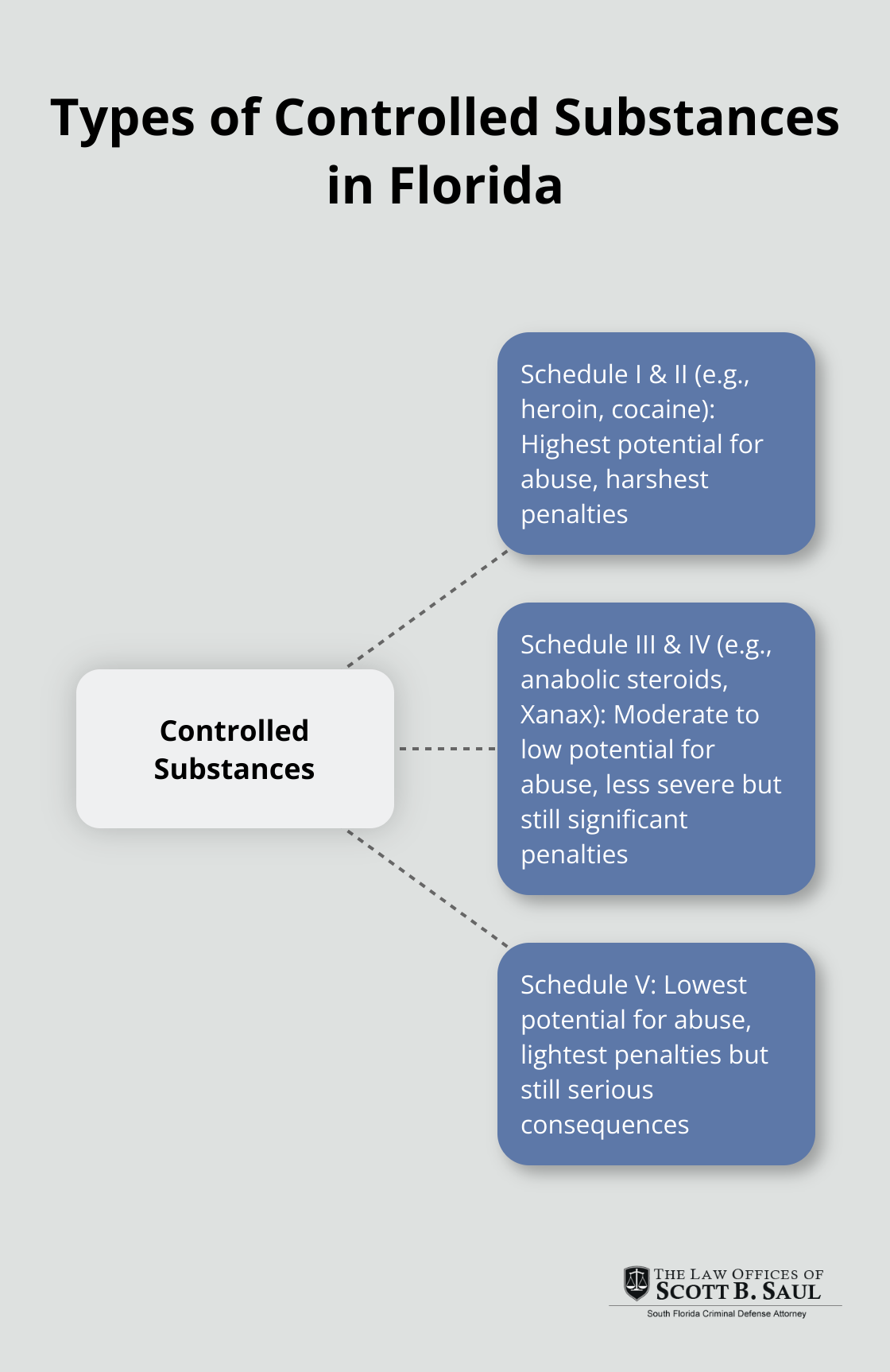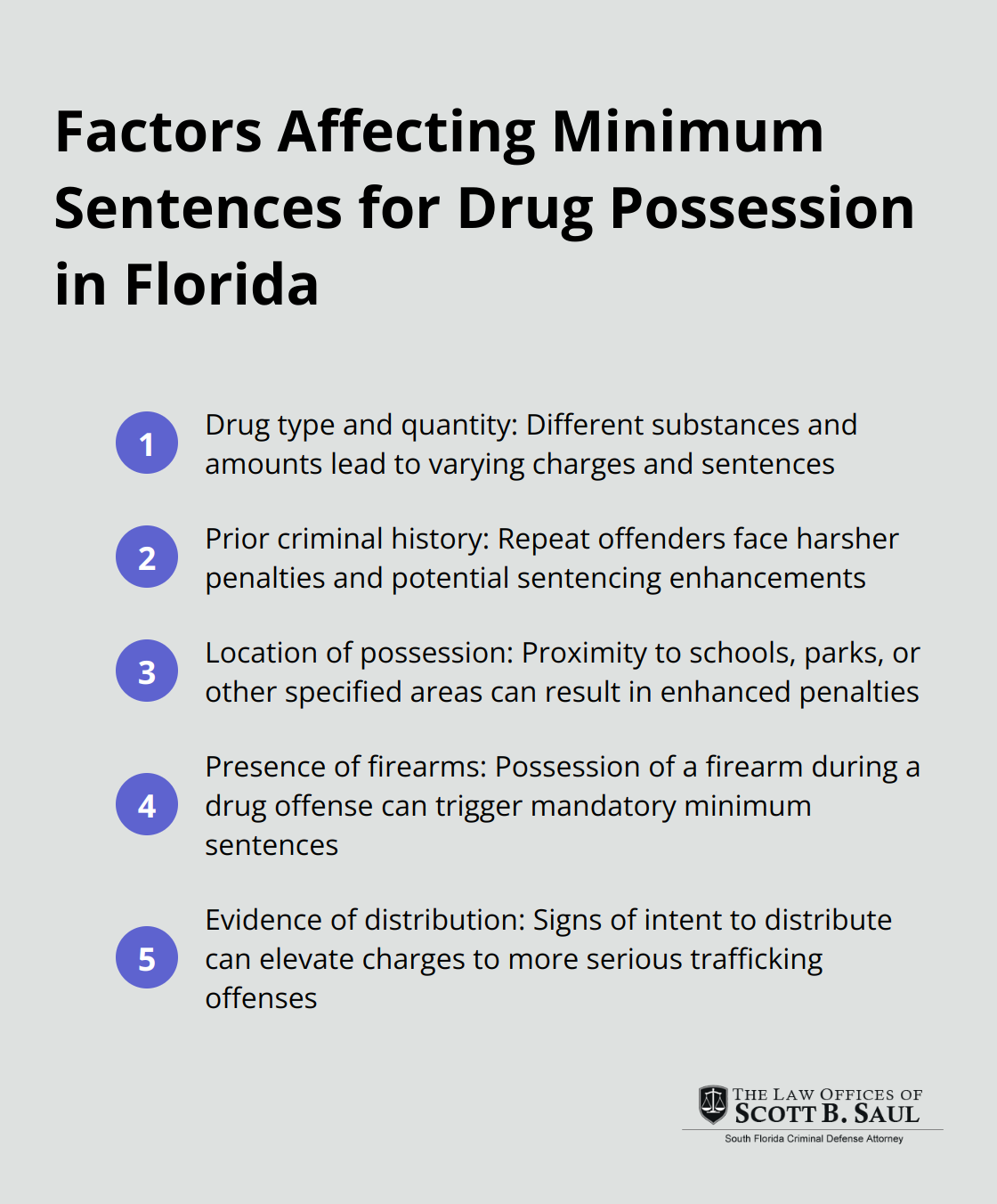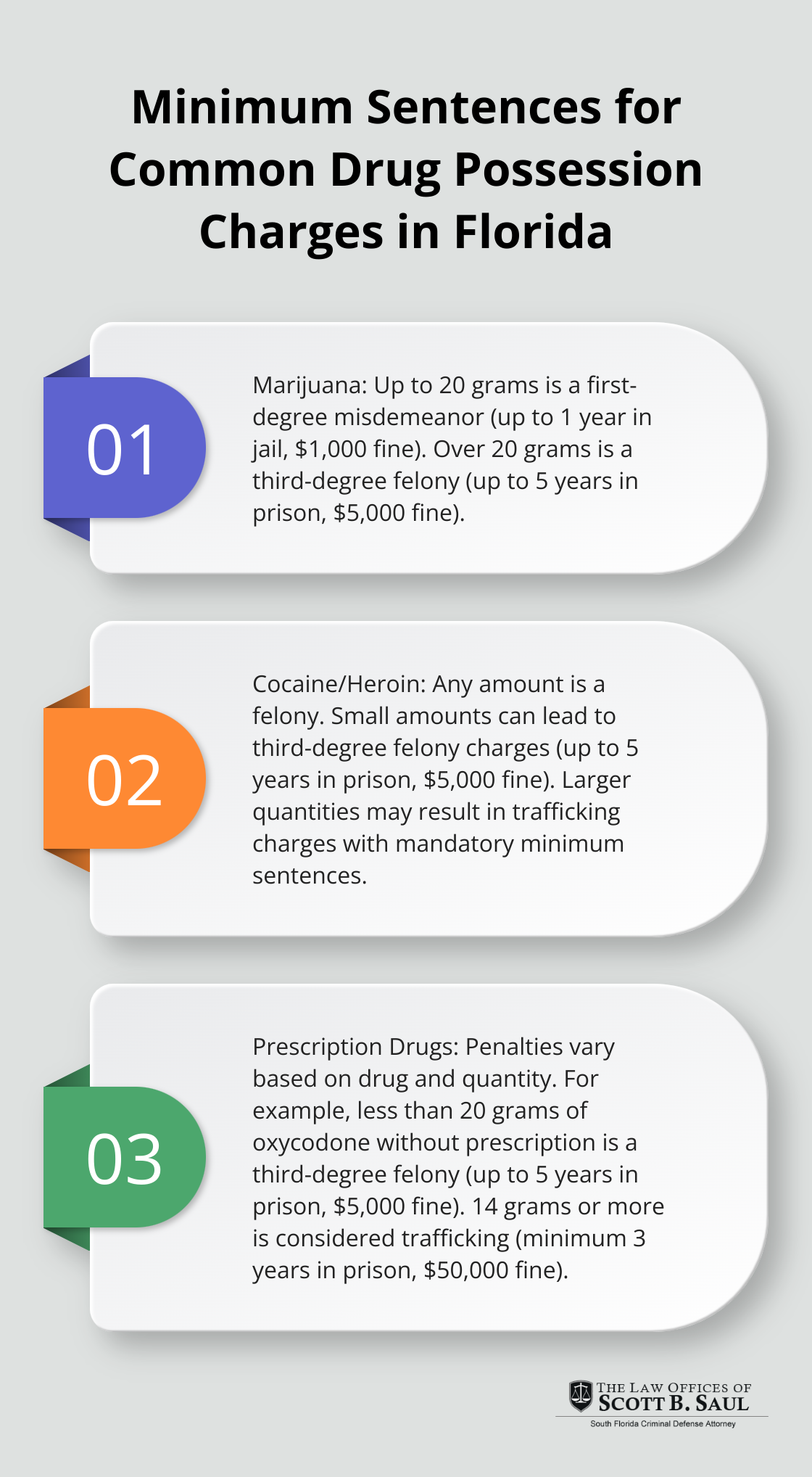What’s the Minimum Sentence for Drug Possession?
By : saulcrim | Category : Criminal Defense | Comments Off on What’s the Minimum Sentence for Drug Possession?
31st Jul 2025

Drug possession charges in Florida can have serious consequences. The minimum sentence for drug possession varies depending on several factors, including the type and amount of substance involved.
At Law Offices of Scott B. Saul, we understand the complexities of drug possession laws and their potential impact on your life. This blog post will explore the key elements that influence minimum sentences for drug possession in Florida, helping you navigate this challenging legal landscape.
What Are Florida’s Drug Possession Laws?
Florida’s drug possession laws carry significant consequences. This chapter explores the key elements of these laws to help you understand the legal landscape.
Defining Drug Possession in Florida
In Florida, drug possession means having control over a controlled substance. The substance doesn’t have to be on your person. You can face charges if drugs are found in your car, home, or any area under your control. Even if you’re unaware of the drugs’ presence, you could still face charges under the concept of “constructive possession.”
Types of Controlled Substances
Florida law sets different thresholds and consequences for various drugs. For instance, possession of cocaine, a Schedule II drug, can result in serious penalties. The schedule of the drug involved in a possession case significantly impacts potential penalties.

Personal Use vs. Intent to Distribute
The law distinguishes between possession for personal use and possession with intent to distribute. This distinction can dramatically affect the severity of charges and potential sentences. Factors that may indicate intent to distribute include:
- The quantity of drugs found
- The presence of packaging materials or scales
- Large amounts of cash
- Communications related to drug sales
For example, possessing a small amount of marijuana might result in a misdemeanor charge for personal use. However, possessing the same drug in larger quantities (especially if packaged in individual baggies) could lead to felony charges for intent to distribute.
Impact of Drug Classification on Penalties
The classification of a drug plays a significant role in determining the severity of penalties for possession. Here’s a brief overview:
- Schedule I and II drugs (e.g., heroin, cocaine): These typically carry the harshest penalties.
- Schedule III and IV drugs (e.g., anabolic steroids, Xanax): Penalties are generally less severe but still significant.
- Schedule V drugs: These usually carry the lightest penalties, but consequences can still be serious.
The Role of Quantity in Drug Possession Charges
The amount of drugs found in your possession can greatly influence the charges and potential sentences. Florida law often sets specific thresholds for different drugs. Exceeding these thresholds can elevate charges from simple possession to trafficking (which carries far stricter consequences compared to possession charges).
Understanding these nuances in Florida’s drug possession laws forms the foundation for building a solid defense strategy. Whether you face charges for personal use or alleged intent to distribute, the specifics of your case matter. The next section will explore the various factors that influence minimum sentences for drug possession in Florida.
What Factors Affect Minimum Sentences for Drug Possession?
Florida’s drug possession laws present a complex landscape where minimum sentences vary based on several key factors. This chapter examines the elements that influence sentencing in drug possession cases.
Drug Type and Quantity
The type and amount of drug involved in a possession case significantly impact the potential sentence. For example:
- Marijuana: Possession of 20 grams or less is typically a first-degree misdemeanor, punishable by up to one year in jail and a $1,000 fine. Possession of more than 20 grams escalates to a third-degree felony, carrying a potential five-year prison sentence and a $5,000 fine.
- Cocaine: Possession, regardless of amount, is always a felony in Florida. Even a small amount can lead to a third-degree felony charge (with penalties including up to five years in prison and a $5,000 fine). Larger quantities can result in trafficking charges, which carry mandatory minimum sentences.
Prior Criminal History
A defendant’s criminal record plays a significant role in sentencing. First-time offenders may qualify for diversion programs or more lenient sentences. However, repeat offenders face harsher penalties. Sentencing enhancements often increase penalties for defendants who already have prior convictions, especially if those convictions are for similar offenses.
Location of Possession
The location where drug possession occurred can dramatically affect the charges and potential sentences. Possessing drugs within 1,000 feet of a school, college, park, or other specified locations can result in enhanced penalties. For example:
- Selling or possessing cocaine with intent to sell within 1,000 feet of a school is a first-degree felony, punishable by up to 30 years in prison.
Aggravating Factors
Several other factors can lead to increased penalties for drug possession in Florida:
- Possession of a firearm during a drug offense can result in mandatory minimum sentences.
- Involving minors in drug-related activities can lead to enhanced charges and penalties.
- Evidence of drug distribution (such as scales or large amounts of cash) can elevate simple possession charges to more serious trafficking offenses.
These factors underscore the importance of experienced legal representation in drug possession cases. Each case presents unique circumstances, and a thorough understanding of these influencing factors is essential for developing an effective defense strategy. The next chapter will explore the specific minimum sentences for common drug possession charges in Florida, providing a clearer picture of potential consequences for various substances.

It’s important to note that under Florida’s drug possession laws, judges cannot take into account factors like your record of community service, the impact of the punishment on your family, or how an untreated addiction may have contributed to the offense when determining mandatory minimum sentences.
Minimum Sentences for Common Drug Possession Charges in Florida
Marijuana Possession Penalties
Florida imposes strict penalties for marijuana possession. Possession of up to 20 grams results in a first-degree misdemeanor charge, punishable by up to one year in jail and a $1,000 fine. Amounts exceeding 20 grams escalate to a third-degree felony, with potential five-year prison sentences and $5,000 fines.
Some Florida counties have implemented citation programs for small amounts of marijuana (potentially allowing offenders to avoid jail time). However, these programs do not apply universally and do not alter state-level penalties.
Cocaine and Heroin Possession Penalties
Florida law classifies cocaine or heroin possession as a felony, regardless of quantity. Even small amounts can lead to third-degree felony charges, with penalties of up to five years in prison and $5,000 fines. Larger quantities often result in trafficking charges, which carry mandatory minimum sentences.
The mandatory minimum sentence depends on the weight of the cocaine or cocaine mixture that the prosecution was able to prove that you were trafficking. This minimum increases with larger quantities.
Heroin possession follows a similar pattern. Possession of 4 grams or more is considered trafficking, with mandatory minimum sentences starting at three years in prison and a $50,000 fine. These penalties increase to 25 years and a $500,000 fine for 30 kilograms or more.
Prescription Drug Possession Penalties
Florida law treats unauthorized prescription drug possession seriously. Penalties vary based on the specific drug and quantity involved. For example, possession of fewer than 20 grams of oxycodone without a valid prescription results in a third-degree felony charge (punishable by up to five years in prison and a $5,000 fine).
Larger quantities of prescription drugs can lead to trafficking charges. Possession of 14 grams or more of oxycodone is considered trafficking, carrying a mandatory minimum sentence of three years in prison and a $50,000 fine.
Factors Affecting Sentencing
These minimum sentences serve as starting points. Several factors can significantly increase penalties:
- Prior convictions
- Location of the offense (e.g., near schools or parks)
- Presence of aggravating circumstances (such as weapons)
Federal charges for drug possession often carry even harsher sentences than state-level charges.

Final Thoughts
Drug possession charges in Florida carry severe consequences. The minimum sentence for drug possession varies based on factors such as substance type, quantity, and location of the offense. Prior criminal history and aggravating circumstances (like firearm possession) can further increase penalties.
Florida’s complex drug laws highlight the need for experienced legal representation. At Law Offices of Scott B. Saul, we understand these intricacies and their potential impact on your life. Our team provides personalized attention and aggressive representation to protect our clients’ rights.
Drug possession charges can have long-lasting effects on your life and future opportunities. We at Law Offices of Scott B. Saul stand ready to guide you through this challenging legal process. Our expertise in criminal defense equips us to fight for your rights every step of the way.
Archives
- January 2026 (1)
- December 2025 (9)
- November 2025 (8)
- October 2025 (8)
- September 2025 (9)
- August 2025 (8)
- July 2025 (8)
- June 2025 (9)
- May 2025 (9)
- April 2025 (8)
- March 2025 (9)
- February 2025 (8)
- January 2025 (9)
- December 2024 (10)
- November 2024 (5)
- July 2024 (2)
- June 2024 (2)
- May 2024 (2)
- April 2024 (2)
- March 2024 (2)
- February 2024 (2)
- January 2024 (2)
- December 2023 (2)
- November 2023 (2)
- October 2023 (2)
- September 2023 (2)
- August 2023 (1)
- July 2023 (2)
- June 2023 (2)
- May 2023 (2)
- April 2023 (2)
- March 2023 (2)
- February 2023 (2)
- January 2023 (2)
- December 2022 (2)
- November 2022 (2)
- October 2022 (2)
- September 2022 (2)
- August 2022 (2)
- July 2022 (2)
- June 2022 (2)
- May 2022 (2)
- April 2022 (2)
- March 2022 (2)
- February 2022 (2)
- January 2022 (2)
- December 2021 (2)
- November 2021 (2)
- October 2021 (2)
- September 2021 (2)
- August 2021 (2)
- July 2021 (2)
- June 2021 (2)
- May 2021 (2)
- April 2021 (2)
- September 2020 (5)
- July 2020 (4)
- June 2020 (4)
- May 2020 (4)
- April 2020 (5)
- March 2020 (4)
- February 2020 (4)
- January 2020 (4)
- December 2019 (1)
- November 2019 (4)
- October 2019 (4)
- September 2019 (4)
- August 2019 (4)
- July 2019 (5)
- June 2019 (4)
- May 2019 (4)
- April 2019 (4)
- March 2019 (4)
- February 2019 (4)
- January 2019 (4)
- December 2018 (4)
- November 2018 (5)
- October 2018 (5)
- September 2018 (4)
- August 2018 (4)
- July 2018 (7)
- June 2018 (4)
- May 2018 (4)
- April 2018 (8)
- March 2018 (4)
- February 2018 (4)
- January 2018 (4)
- November 2017 (4)
- October 2017 (4)
- September 2017 (4)
- August 2017 (7)
- July 2017 (6)
- June 2017 (4)
- May 2017 (4)
- April 2017 (4)
- March 2017 (4)
- February 2017 (7)
- January 2017 (4)
- December 2016 (7)
- November 2016 (4)
- October 2016 (4)
- September 2016 (10)
- August 2016 (4)
- July 2016 (4)
- June 2016 (4)
- May 2016 (4)
- April 2016 (4)
- March 2016 (4)
- February 2016 (7)
- January 2016 (4)
- December 2015 (5)
- November 2015 (4)
- October 2015 (7)
- September 2015 (4)
- August 2015 (4)
- July 2015 (13)
- June 2015 (9)
- May 2015 (8)
- April 2015 (6)
- March 2015 (4)
- February 2015 (4)
- January 2015 (4)
- December 2014 (4)
- November 2014 (4)
- October 2014 (4)
- September 2014 (3)
Categories
- Adjudication (1)
- Bankruptcy (1)
- Burglary Crimes (3)
- calendar call (1)
- Car Accident (1)
- Criminal Defense (382)
- Cyber Crimes (7)
- DNA (1)
- Domestic Violence (9)
- Drug Crimes (5)
- DUI (12)
- Embezzlement (1)
- Environmental Crimes (4)
- Expungement Law (2)
- Federal Sentencing Law (3)
- Firearm (3)
- Forgery (4)
- General (82)
- Healthcare (3)
- Immigration (1)
- Indentity Theft (1)
- Insurance (5)
- judicial sounding (2)
- Juvenile Crimes (4)
- Manslaughter (4)
- Money Laundering (3)
- Organized Crime (1)
- Racketeering (1)
- Reckless Driving (3)
- RICO (3)
- Sealing and Expunging (2)
- Sex Offense (1)
- Shoplifting (1)
- Suspended Driver's License (1)
- Traffic (4)
- Trending Topics (1)
- White-collar Offenses (1)

